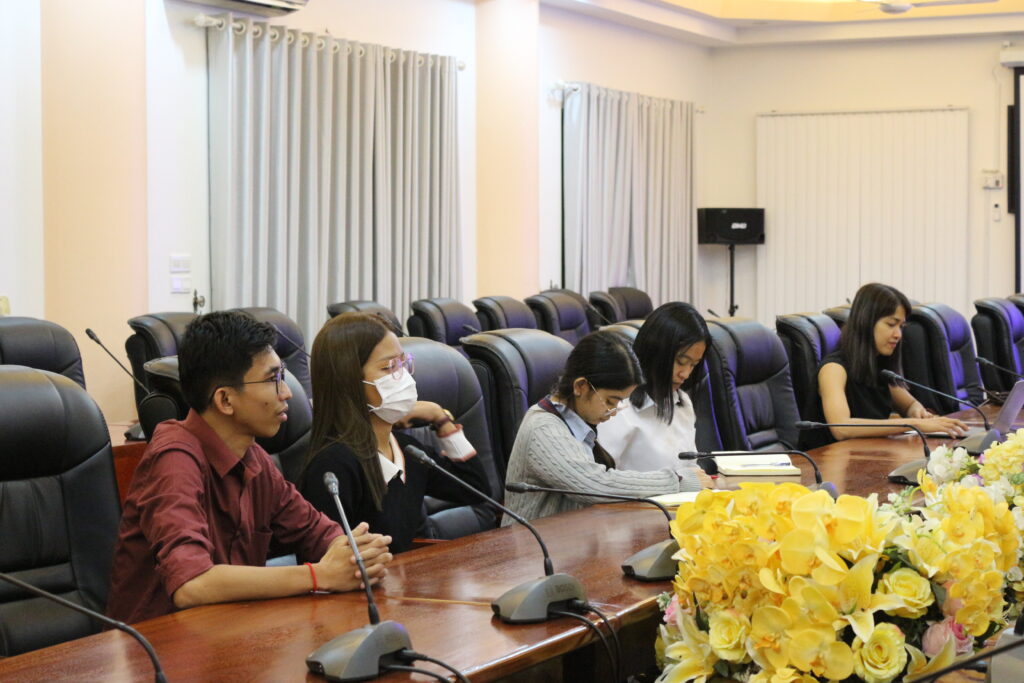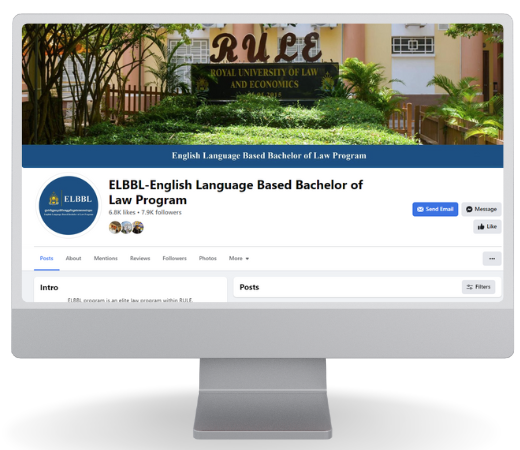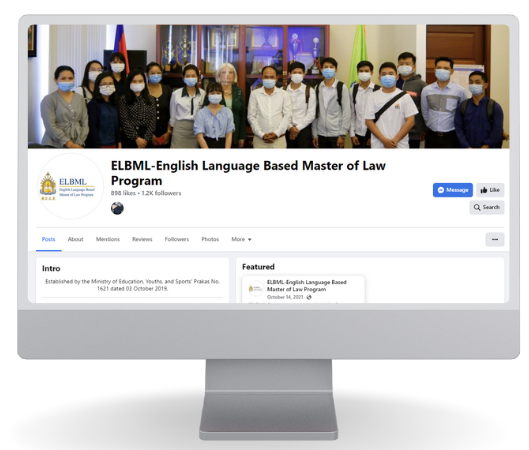Frequently Asked
Questions
ELBBL is a bachelor of law program (LL.B.) taught in English. ELBBL’s curriculum focuses on courses, legal research, and moot court program. ELBBL is a three-year program.
ELBBL accepts students who finished their foundation year. To become an ELBBL student, the applicant must pass the entrance exam which consists of an English Proficiency Test and an interview.
Applicants can register online or at the ELBBL Office on the 5th floor, Building I of the Royal University of Law and Economics.
Registration starts in July and ends in early August. The entrance exam, which is the English Proficiency Test, will take place one week after the registration deadline. The interview will take place between one week to 10 days after the English Proficiency Test.
The test consists of reading and writing.
The interview aims to assess the applicant’s general knowledge, legal knowledge, and speaking skills. It is also an assessment of the applicant's personality and motivation.
If you have an IELTS of 5.5 or a TOEFL score of 55, you do not need to take the exam. However, you are still required to take part in the interview.
Yes, you can enroll in ELBBL even if your foundation year degree is not in law. However, once accepted into ELBBL, students must take two oriented courses: (1) Introduction of Law and (2) Introduction to Constitution.
The Moot Court Program is a curricular activity in law school where students participate in simulated/hypothetical court or arbitration proceedings. Students will have the opportunity to practise their legal oratory and research. In year 3, ELBBL students must participate in one mandatory moot court program. The mandatory moot court programs are Jessup Moot Competition, Red Cross International Humanitarian Law Moot Court Competition, and International Commercial Arbitration.
No, the ELBBL program is not a dual degree program. ELBBL is a unique and separate law degree program under the Royal University of Law and Economics.
Yes, you are eligible upon graduation from the ELBBL. Graduates from the ELBBL program are issued a certificate from the Royal University of Law and Economics and recognized by the Ministry of Education, Youth, and Sport. ELBBL alumni were eligible for the legal profession exam and passed the exam. Some of the ELBBL students are judges, lawyers, clerks, arbitrators, and public notaries.
ELBBL offers up to 13 full scholarships for female students provided by the Raoul Wallenberg Institute (RWI) in Cambodia.
The tuition fee is USD800/year or USD420/semester.
Yes, ELBBL nominates students for a semester exchange program at partner universities. Please go to the exchange program section for further detail.
Yes, ELBBL has extra-curricular activities such as debates and eight different moot court competitions.
ELBBL graduates were admitted to many universities in Europe, Asia and the United States to further their studies. Additionally, they were also awarded scholarships.


ELBBL is a bachelor of law (LL.B.) program while ELBML is a two-year master of law (LL.M.) program. The ELBML curriculum is, therefore, amore specialized and advanced both in terms of substance and skill-based content. Our classes are structured to be more seminar-focused, with innovative and interactive teaching methods (e.g., the Socratic teaching method). Students are required to prepare and actively participate in class discussions and debates on various contemporary legal topics and issues in Cambodia and the region.
ELBML is a localized graduate law program, specifically aimed at providing students with topical and up-to-date legal knowledge and skills necessary for pursuing a successful legal career in Cambodia. Where relevant, ELBML courses also incorporate international and comparative aspects to Cambodian laws and local practices to broaden students' perspectives and knowledge on the subject under consideration. Most ELBML faculty members are prominent legal practitioners and/or researchers with years working and/or teaching experience in their specialized fields. Therefore, students will obtain sound legal knowledge and skill set that will help them thrive in any legal profession in Cambodia.
No. As noted, ELBML is a localized LL.M. program that particularly focuses on Cambodian laws and legal practices. If you wish to pursue an LL.M. abroad, completing the ELBML coursework-thesis track would be an added value and would likely improve your prospect of being admitted to an overseas LL.M. program.
Students without a bachelor's degree or background in law may be required to take a pre-master's course provided by RULE. ELBML curriculum also includes in the first term an "Introduction to Cambodia's Legal Theory and Practice" course to provide students with basic knowledge on Cambodia's legal system and practice. Tutorials are also provided to help students grasp the basics of legal analysis, reasoning, and writing.
ELBML is a credit-based program. There are three terms per academic year, namely Fall Term, Spring Term, and Summer Term. The regular class schedule comprises of 2 or 3 classes per week. Depending on the lecturers or professors, classes may run from 5:45 PM - 8:30 PM.
First, register for the entrance examination. The exam result will be released within five business days. Those who pass the entrance examination will be contacted for an admission interview. Once being admitted to the program, the students may apply for our partial tuition fee scholarships. The scholarship result will be released within the first week of October. Finally, to enroll, students must submit the enrolment application and pay the tuition fee before the term begins.
- Registration for the entrance examination for the 2024 Intake will be opened from 01 August – mid September 2024.
- Entrance examinations (i.e., English proficiency test and law exam) will be organized from mid-August. The dates and times of the examination will be posted on our website and Facebook page.
- Admission interview will be organized from late August to end of September 2024.
- Partial tuition fee scholarship applications will be opened until 30 September 2024.
- Enrolment application deadline will be on 05 October 2024.


